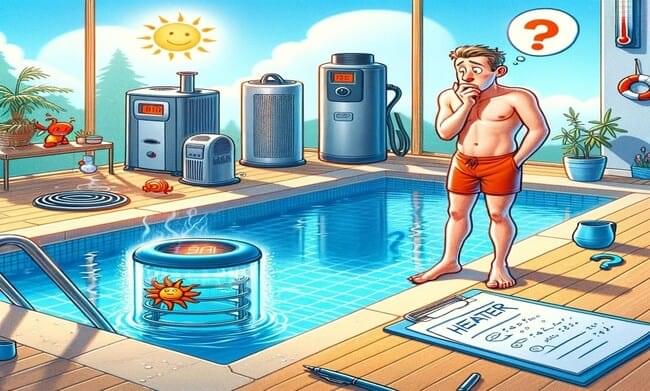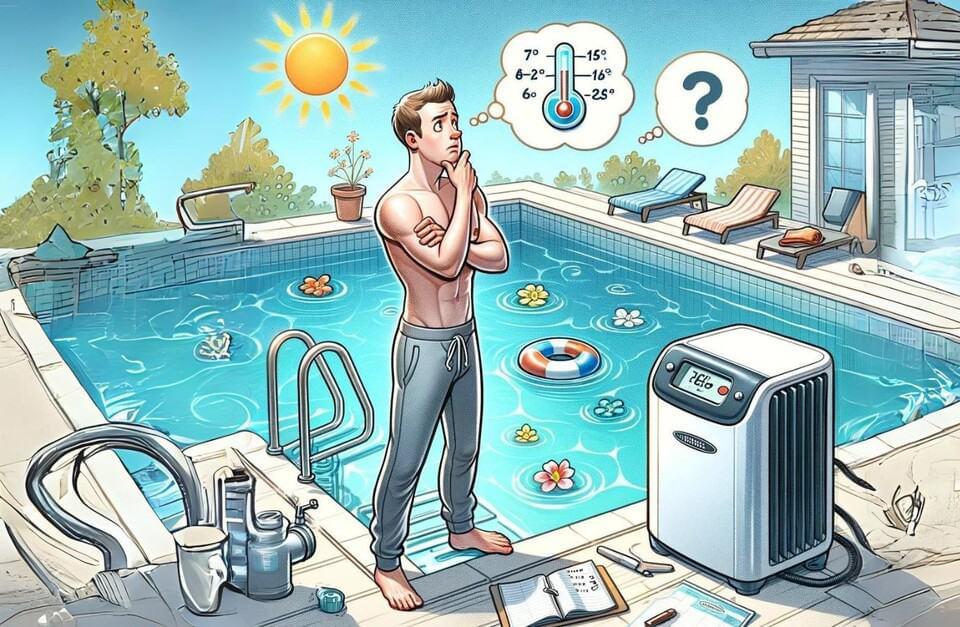Selecting the right size heater for your pool is essential for maintaining an enjoyable swimming experience throughout the year. Choosing the perfect heater not only ensures a comfortable water temperature but also contributes to energy efficiency, saving you money in the long run. In this article, we will provide you with the necessary guidelines to help you make an informed decision on the ideal pool heater for your needs. Check out this quick calculator…
Several factors come into play when determining the proper size of a pool heater. The most important considerations include the surface area and volume of your pool, as well as the desired water temperature, outside temperatures, and the rate at which the heater can generate heat. As each pool is unique, it is crucial to understand these factors in order to make a well-informed investment.
After establishing the essential factors, pool owners can explore different types of pool heaters available on the market, such as gas, electric, and solar heaters. Each type comes with its own set of advantages and drawbacks, which we will discuss in this article. With a clear understanding of the options and the factors that influence heater performance, you will be well-prepared to make the right choice for your pool.
Understanding Pool Heater Basics

What Is a Pool Heater?
A pool heater is a device that maintains and regulates the temperature of your pool water, ensuring a comfortable swimming experience. Pool heaters are essential for those who desire a consistent pool temperature, especially in cooler climates or during off-peak swimming seasons. There are a few different types of pool heaters available, each with their own specific benefits. To decide on the appropriate size heater for your pool, you should focus on factors such as energy efficiency, desired temperature, and heating speed.
Types of Pool Heaters
There are four primary types of pool heaters to consider for your swimming pool:
- Gas Heaters: Gas heaters are well-suited for heating pools quickly, and their popularity is primarily due to their efficiency. They can be powered by natural gas or propane, and generally provide consistent performance regardless of the weather. Gas heaters are often ideal for pools that are not used frequently or do not need to be heated constantly. Check out our favorite if you have the commodity of gas by your pool.
- Heat Pumps: Heat pumps are suitable for those interested in an energy-efficient and environmentally friendly option. They work by extracting heat from the surrounding air and transferring it to the pool water. Heat pumps perform better in warmer climates and take longer to heat the pool than gas heaters. However, they consume significantly less energy, which can reduce utility bills over time. Check out our best heat pumps
- Solar Heaters: As the name suggests, solar heaters harness the sun’s energy to heat your pool. Solar heaters utilize solar panels and a circulation system to transfer heat to the pool. While highly energy-efficient, solar heaters are primarily dependent on weather conditions and are best suited for warmer, sunnier climates. Check out our solar pool heater article.
- Electric Heaters: Electric heaters work by converting electricity into heat and transferring that to the pool water. Though they may consume more energy than other pool heater options, they are suitable for locations with limited access to gas or solar energy. See what we recommend for this need
When choosing a pool heater, it’s essential to consider the BTUs (British Thermal Units) required to maintain your desired pool temperature. More BTUs means a higher heating capacity, which directly impacts the performance of the pool heater. Ultimately, the best size of the heater for your pool depends on the type of heater, pool size, desired temperature, and energy costs.
Calculating the Right Size Heater for Your Pool
Factors Influencing Heater Size
There are a few key factors that influence the size of the pool heater you’ll need:
- Climate: The local climate can impact how much heat your pool loses, with colder climates requiring more powerful heaters.
- Pool volume: Larger pools need more BTUs to achieve the desired temperature.
- Wind speed: Windier locations may experience greater heat loss, requiring a more powerful heater.
- Temperature differential: The greater the difference between the desired pool temperature and the ambient air temperature, the more heating capacity you’ll need.
- Pool cover: Using a pool cover can help reduce heat loss, potentially allowing for a smaller heater.
Keep in mind that your budget may also affect your choice of heater size.
How to Measure Your Pool
To properly size your pool heater, you’ll need to know the volume and surface area of your pool. Follow these steps to ensure accurate measurements:
- Measure the length, width, and depth of your pool.
- For rectangular pools, surface area is calculated by multiplying the length by the width. For circular pools, multiply the diameter by itself, and then multiply by 3.14 (π).
- To determine the volume in gallons, multiply the surface area by the average depth, then multiply by 7.5 for rectangular pools, or 5.9 for circular pools.
Making the Calculations
Now that you have the necessary measurements, use the following steps to calculate the appropriate size pool heater or check out the calculator up above:
- Determine the desired temperature for your pool.
- Calculate the temperature differential by subtracting the ambient air temperature from the desired pool temperature.
- Calculate the heat loss in BTUs per hour using the following formula:
- BTU/hour = Surface Area (sq. ft.) × Temperature Differential (°F) × 12
- Determine the total heating requirements in BTUs by dividing the total heat loss by the pool cover efficiency (assume 70% efficiency if no pool cover).
- Divide the total BTUs needed by the number of hours you want it to take to heat the pool to find the required BTUs per hour of the heater.
This sizing calculation will help you find the right pool heater to efficiently and effectively maintain your desired pool temperature. But remember, it’s always a good idea to consult with a pool professional to ensure an appropriate heater is selected for your unique circumstances.

Frequently Asked Questions
How can I calculate the required BTU for heating my pool?
To calculate the required BTU (British Thermal Units) for heating your pool, you can use the formula: BTU = Pool Surface Area (in square feet) x Temperature Difference (desired pool temperature – average ambient temperature) x 12. This will give you an estimate of the heater size needed to efficiently heat your pool.
Is it better to choose a larger heater for my swimming pool?
A larger heater can heat your pool more quickly, which is beneficial in colder climates or if you have a large pool that takes a long time to heat. However, a larger heater will also consume more energy and increase your operating costs. It’s important to find the right balance between heater size and energy efficiency.
What factors should I consider when selecting a heater for my above-ground pool?
When selecting a heater for your above-ground pool, consider factors such as pool size, desired temperature, heating time, energy efficiency, and budget. You should also consider what type of heater, such as gas, electric, or solar, works best for your specific needs and climate. See our above ground picks
How does pool volume affect the size of the heater I need?
Pool volume directly impacts the size of the heater needed to maintain your desired temperature. Larger pools require more BTUs to heat, meaning a larger heater is necessary to keep the water at a comfortable temperature. When calculating the required BTU, it’s crucial to consider both pool surface area and volume.
Can you recommend a good size calculator for determining my pool heater needs?
For a quick and easy way to determine the appropriate heater size for your pool, you can visit various online pool supply websites that offer free pool heater sizing calculators. These calculators typically ask for information such as pool size, desired temperature, and location to provide an accurate estimate of the heater size you need. Check out our calculator up top of the page
What are the advantages of using a pool heat pump over a gas heater?
Pool heat pumps are a more energy-efficient option compared to gas heaters, as they transfer heat from the air to the water rather than generating heat through combustion. While they may have a higher upfront cost, heat pumps typically have lower operating costs and a longer lifespan. Additionally, they produce fewer greenhouse gas emissions, making them a more environmentally friendly option.
